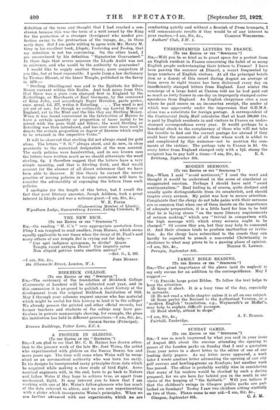MODERN SERMONS.
[To ME EDITOR OF THE " SPECTATOR."] SIR,—When I said "avoid sentiment," I used the word and thought it would be understood in the sense of simulated or exaggerated emotion. Perhaps I should have said "avoid sentimentalism." Real feeling is, of course, quite distinct and usually quite distinguishable from its eouuterfeit, and should inspire every sermon. My point was how to secure attention. Complaints that the clergy do not take pains with their sermons are so common that when one of them insists on the importance of adequate preparation, it is a little hard for him to be told that he is laying stress "on the mere literary requirements of sermon making," which are "trivial in comparison with the high message with which every sermon ought to be charged." Of course they are, but they may help to commend it. And their absence tends to produce inattention or irrita- tion. As the clergy have subscribed to the creeds they can hardly be expected to preach a non-credal Christianity in obedience to what may prove to be a passing phase of opinion.


































 Previous page
Previous page